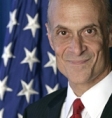A Global Approach
 This week I traveled to Canada to speak with international commissioners from around the world on data privacy and to Mexico to meet with Mexican officials and governors from our border states. All this travel illustrates how global the mission of homeland security really is.
This week I traveled to Canada to speak with international commissioners from around the world on data privacy and to Mexico to meet with Mexican officials and governors from our border states. All this travel illustrates how global the mission of homeland security really is.From protecting our land and sea borders to screening travelers and goods coming from other countries, a large part of our mission necessarily involves relating to and working with partners all over the world.
In pursuit of this mission, we are engaged overseas nearly as much as any department in the United States government. We have DHS personnel on nearly every continent and in many foreign cities. Our Customs and Border Protection officers screen U.S.-bound cargo at more than 50 overseas ports. Immigration and Customs Enforcement has more than 50 attaché offices in 35 countries that investigate human smuggling and money laundering cases. The Secret Service investigates counterfeit U.S. currency all over the world. And the Coast Guard works with the U.S. Navy to protect vital maritime assets in the Middle East, including in Iraq.
In our 21st-century global environment, people, goods, money, and ideas routinely move around the world in a matter of seconds and hours, rather than days and weeks. Unfortunately, so can terrorists. We need to look no further than to 9/11, where the plot was hatched in Central Asia, using recruits from Saudi Arabia who trained in Afghanistan, planned in Europe and launched their attack in America.
That’s why it’s vital that we continue to partner with our allies overseas to share information and develop international standards to combat the global threat we face.
Working together with our foreign partners to enhance security is clearly a win/win for both sides. When we screen cargo overseas and strengthen the security of the international supply chain, we’re not only keeping America safe, but also increasing the safety of countries where the cargo originates. And through advanced planning and coordination with these partners, we can mitigate the effects of natural disasters and help stop the spread of infectious diseases.
While globalization presents us with clear security challenges, it also provides opportunities to expand our cooperation with international partners to protect our shared interests. I’ll keep you updated on our progress as we work with our colleagues overseas, as well as those here in the U.S. to combat terrorism and keep the homeland safe.
Thanks for reading. I look forward to hearing from you.
Michael Chertoff
Labels: international partners, security










